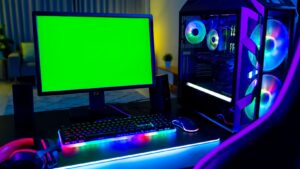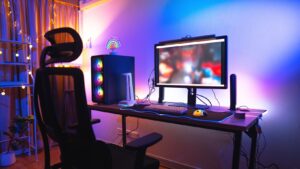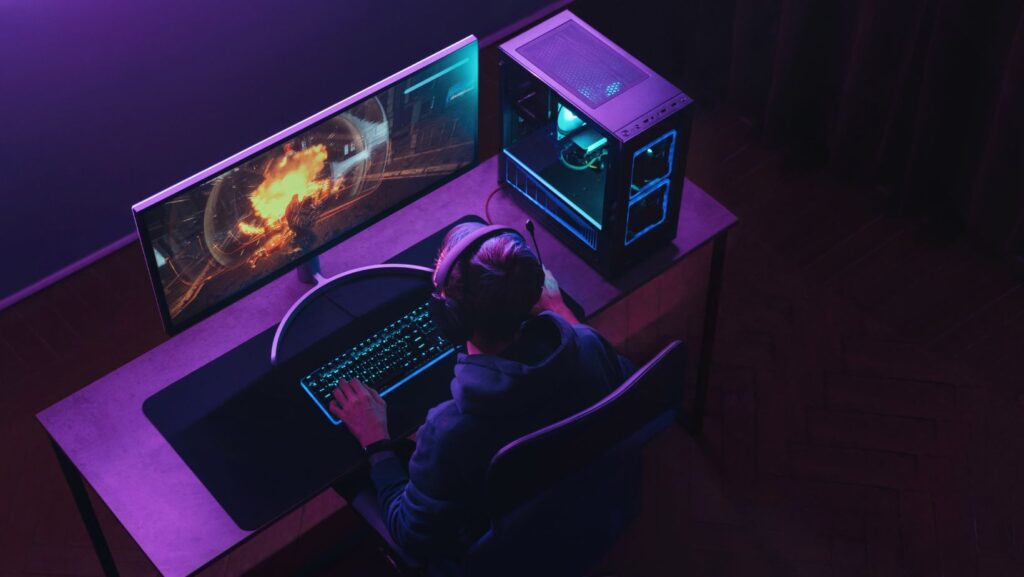Unleashing the full potential of a gaming PC goes beyond the realms of high-resolution video games. It’s a powerhouse that can be harnessed for a myriad of exciting ventures. From creating digital art to mining cryptocurrencies, the possibilities are as boundless as your imagination.
This article delves into the diverse world of gaming PCs, exploring unconventional uses that may surprise even seasoned tech enthusiasts. It’s not just about the games anymore; it’s about pushing the boundaries of what’s possible with this versatile machine. So, buckle up as we take a thrilling ride into the multifaceted universe of gaming PCs.
Things to Do with a Gaming PC
To truly harness the power of a gaming PC, understanding hardware and software essentials proves pivotal. This section illuminates these critical aspects, assisting gamers to maximize their device usage.
The Basics of Gaming PC Hardware
 Hardware forms the physical backbone of any gaming PC. It includes the central processing unit (CPU), graphics processing unit (GPU), random access memory (RAM), and storage devices such as hard disk drives (HDDs) or solid-state drives (SSDs). The CPU, often termed the ‘brain’ of the computer, undertakes complex computations, whereas the GPU specializes in rendering graphics. RAM provides temporary storage for active processes. The HDD or SSD offers more long-term storage for data, the latter being faster but often more expensive. Balancing these aspects leads to a well-performing gaming PC. More detailed specifications like clock speeds, threads, and cores contribute to the overall performance.
Hardware forms the physical backbone of any gaming PC. It includes the central processing unit (CPU), graphics processing unit (GPU), random access memory (RAM), and storage devices such as hard disk drives (HDDs) or solid-state drives (SSDs). The CPU, often termed the ‘brain’ of the computer, undertakes complex computations, whereas the GPU specializes in rendering graphics. RAM provides temporary storage for active processes. The HDD or SSD offers more long-term storage for data, the latter being faster but often more expensive. Balancing these aspects leads to a well-performing gaming PC. More detailed specifications like clock speeds, threads, and cores contribute to the overall performance.
Knowing Your Gaming PC Software
Software, the set of instructions that run on hardware, remains just as crucial. This comprises the operating system (OS), drivers, game applications, and any supplementary software. The OS acts as a bridge between the user and the hardware, popular choices including Windows, Linux, and MacOS. Drivers ensure that the OS can interact with and control the hardware. Game applications contribute to the main purpose of a gaming PC: immersive gaming. Supplementary software, like game recording or streaming apps, enhances this purpose. Regular software updates improve gaming performances and protect against security threats, indicating the necessity for routine maintenance.
Optimizing Your Gaming PC
Enhancing a gaming PC’s performance often involves amending hardware specifications and fine-tuning software settings. Follow the subtopics below to learn the intrinsics of upgrading and tweaking for a better gaming experience.
Upgrading Your PC’s Hardware
 Upgrades in a gaming PC’s hardware provide substantial improvements in performance. To start, consider replacing the central processing unit (CPU). A faster CPU boosts the overall speed of the computer, paving the way for faster processing of gaming data.. Other upgrades involve the Random Access Memory (RAM) and storage devices. Increased RAM lets your PC store more data for instantaneous access, reducing lag during intensive gaming sessions. On the other hand, using a Solid-State Drive (SSD) instead of a traditional Hard Disk Drive (HDD) reduces load times, hence, accelerating game launching and level loading times.
Upgrades in a gaming PC’s hardware provide substantial improvements in performance. To start, consider replacing the central processing unit (CPU). A faster CPU boosts the overall speed of the computer, paving the way for faster processing of gaming data.. Other upgrades involve the Random Access Memory (RAM) and storage devices. Increased RAM lets your PC store more data for instantaneous access, reducing lag during intensive gaming sessions. On the other hand, using a Solid-State Drive (SSD) instead of a traditional Hard Disk Drive (HDD) reduces load times, hence, accelerating game launching and level loading times.
Tweaking Your PC’s Software Settings
Optimization doesn’t end with hardware upgrades; refining software settings on a gaming PC contributes to its performance too. To start, keep the operating system updated. Current updates often provide performance enhancements and security fixes, ensuring smooth and secure gaming. Drivers, particularly for GPU, should be kept current. Updated drivers can enhance graphics and stability, directly impacting in-game visual quality and performance.
Expanding Beyond Gaming
 So, you’ve seen how a gaming PC’s utility extends beyond the realm of gaming. It’s a tool for digital art creation, cryptocurrency mining, and so much more. The power of these machines lies not just in their hardware, but also in the software they run. Understanding and optimizing these components can unlock a world of possibilities.
So, you’ve seen how a gaming PC’s utility extends beyond the realm of gaming. It’s a tool for digital art creation, cryptocurrency mining, and so much more. The power of these machines lies not just in their hardware, but also in the software they run. Understanding and optimizing these components can unlock a world of possibilities.
Hardware upgrades and software tweaks can significantly enhance your gaming PC’s performance. Whether it’s a faster CPU, a more powerful GPU, or additional RAM, every upgrade counts. And don’t forget about software. Regular updates and maintenance are crucial for keeping your machine running smoothly and securely.

